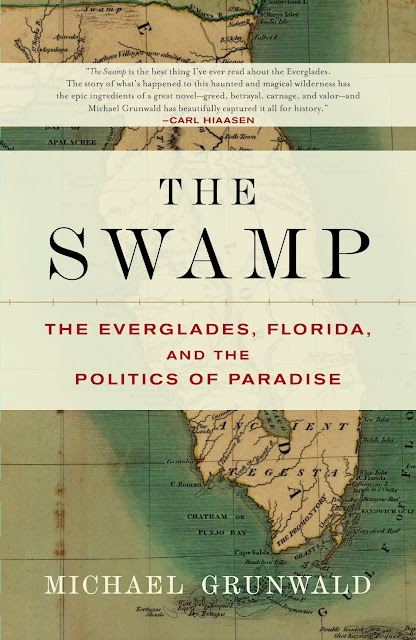The Swamp
I can't recall a more thorough, better researched book than The Swamp, Michael Gunwald's 2006 non-fiction examination of Florida's famed vast wetland. One subject to abuse and neglect over the centuries. This one-of-a-kind ecosystem has been the target of politician and entrepreneur alike, visions of development dancing in their reptilian brains. Washington Post reporter Grunwald's investigational skills, frequently awarded, really flowers with this sprawling tome. One can only agree with Florida novelist Carl Hiaasen when he raves that this work "has the epic ingredients of a great novel-greed,betrayal, carnage, and valor..."
The Swamp opens with conjectures/descriptions of the flat landscape in prehistoric times, an untamed "ocean of grass" bespotted with all manner of insect, algae, wildflower, snake, and punishing humidity. It was once one hundred miles long and sixty miles wide, comprising in part the area in which I've spent most of my life - West Palm Beach. Time would bring concrete canyons and miles of pavement. Suburban sprawl resulting in places like Parkland in Broward County that encroached on the Everglades, pushing its reaches further west and messing with its aquifers.
Grunwald provides an extensive history of all the notables (in Florida and elsewhere) who tried to drain it or save it. Governors, environmentalists, barons, writers. Reading The Swamp provides one with so many players that it often requires re-reading of the previous page to remember who is who. All are discussed with impressive detail. It is never less than fascinating.
Names you may have heard: Margery Stoneman Douglas. Francis Vose. Hamilton Disston. Henry Flagler. Fred Elliot. Lindsey Holland. Here, they become authors of the fate of this natural resource.
There is plenty of scientific detail. Descriptions of the grand ideas of wetland drainage and the ecological fallout, much of which unfortunately came to pass. Also, all the associated backroom politicking, often quite deflating. Thank God that proposed airport never happened. Grunwald's tone is frequently sardonic, and he does not spare his feelings for Big Sugar or the Army Corps of Engineers. What a history we have. Every Floridian should read The Swamp. And you too, invisible audience. I would go so far as to say it should be on high school reading lists. It provides a better history of the Sunshine State than any of the texts I encountered back in the day.



Comments